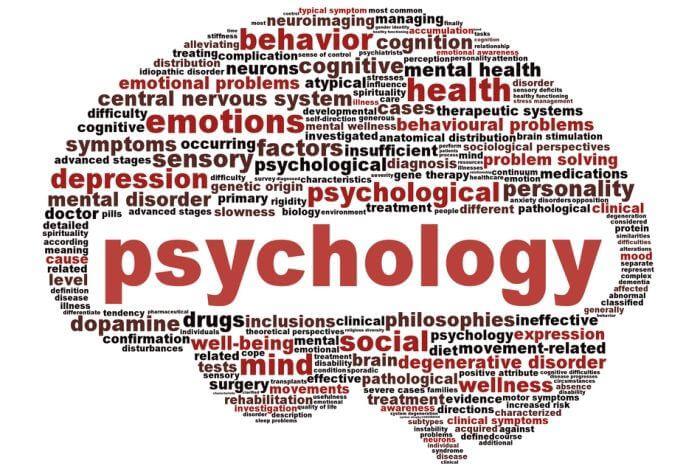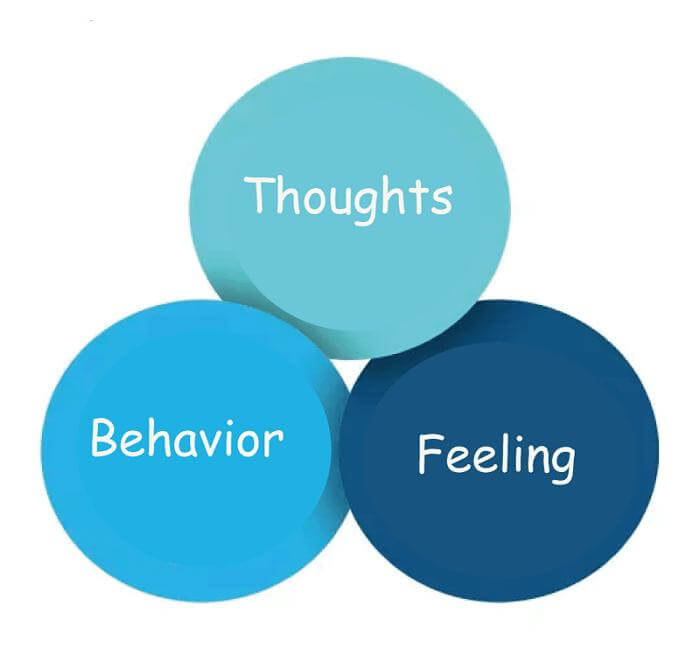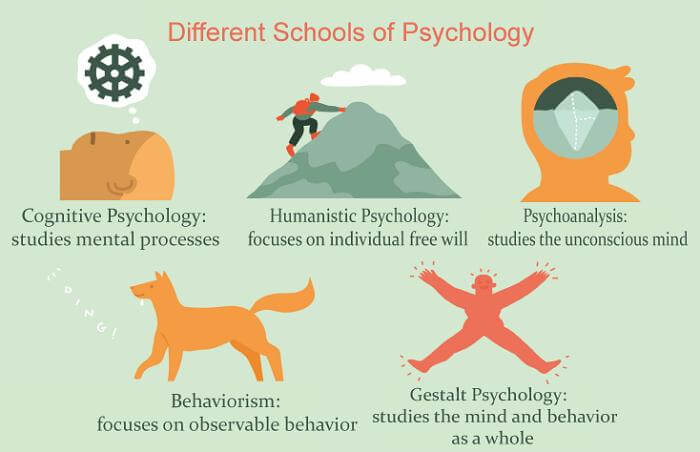Psychology DefinitionAboutThe study of the mind and behavior of a human being through scientific methods is called psychology. It includes the study of thoughts, feelings, and other conscious and unconscious processes inside our brains. It is a branch of study that links the social and the natural sciences and has a very broad scope for study. 
The Greek letter (psi), from which the word psyche has emerged plays an important role when we talk about the definition of psychology. The term psychology is derived from the word 'psyche' which originated from 'psi'. Researchers that are working in the field of psychology study cognition, attention, perception, emotion, subjective experiences, intellect, motivation, and brain function as well. They also have their prime focus on the unconscious mind. To determine the causes and correlations between different psychological processes and variables, research psychologists take the help of various empirical methodologies. Clinical and counseling psychologists, on the other hand, employ symbolic interpretation to a certain extent, but not very much. 
While psychological knowledge is frequently used to diagnose and treat mental health issues, it is also focused on comprehending and resolving issues in a variety of human endeavors. There are a number of psychologists working in therapeutic settings, which focus on providing psychotherapy in clinical, counseling, or educational settings. A different group of psychologists is employed in institutional and corporate settings. Some other psychologists are employed in work related to forensic science, sports, media, health, human development, aging, and education. DefinitionThe Greek word "psyche", which refers to spirit or soul, is the origin of the word psychology. The suffix -o-logia, which means "study" or "research," is whence the word "psychology" gets its last syllable. Steven Blankaart was the one who used the term "psychology" for the first time in English in his 1694 publication 'The Physical Dictionary'. The dictionary states, "Anatomy addresses the body whereas psychology treats the soul." HistoryThe history of psychology is one very important thing to understand when we understand psychology for what it is. During the primitive days of psychological studies, the philosophical study of psychology was done by a certain number of ancient civilizations in different parts of the globe, which included India, Greece, Egypt, and so on. The Ebers Papyrus, written in ancient Egypt, made mention of mental health problems like depression. The Greek physician Hippocrates proposed the idea that physical rather than supernatural factors could be to blame for mental diseases as early as the fourth century B.C. Plato proposed that all mental operations take place in the brain (around 387 BCE) and Aristotle proposed a statement that countered that of Plato as he said that they occur in the heart (around 335 BCE). In China, psychological knowledge developed through the writings of Confucius and Laozi, and later from the teachings of Buddhism. This collection of knowledge includes methods for concentrating thought and action, insights gained from self-reflection and observation, and more. Indian philosophy, however, examined the differences that are there between the various levels of awareness under the influence of Hinduism. The dichotomy that exists between a person's fleeting worldly self and their eternal, unchanging soul played a major role in forming the Indian history of psychology. It was a major concept of the Upanishads and other Vedic texts that served as the basis for Hinduism which, in turn, had its relation to psychology. Foundation of School of Thoughts1) StructuralismWilhelm Wundt, a known psychologist, traveled to Leipzig University, where he founded the psychological laboratory that popularised experimental psychology. Wundt concentrated on dissecting mental processes into their most fundamental elements, which later came to be known as structuralism. Following the ideas of Wundt, structuralism was developed by Edward Titchener, who used introspection as a tool. Structuralism is not in use in practical psychology anymore, but it is an important part of psychological history. 2) Gestalt PsychologyThe foundation of Gestalt psychology (which was developed by Koffka, Wertheimer, and Kohler in the early 20th century) is the notion that people see things as cohesive wholes. The Gestaltists argued that the whole of experience is significant and differs from the sum of its components, contrary to structuralism's tendency to break down thoughts and behavior into smaller component elements. 3) FunctionalismThe idea of functionalism, the school of thought that emerged after structuralism, had its emphasis on the Darwinian idea of a behavior's usefulness to the individual. It was a kind of answer to structuralism and was developed by William James, John Dewey, and Harvey Carr. Different Approaches to PsychologyThere are a number of different schools of psychology, which signify different types of approach to psychology. Here is a brief description. 
1) BiologicalPsychologists typically view biology as the foundation for thinking and emotion, making it a crucial field of study. Biological psychology, which is often called behavioral neuroscience, is the study of the physiological and genetic processes, which determine the behavior in both humans and other animals. The physical underpinnings of behavior are the main focus of modern behavioral neuroscience. The neurological, genetic, and cellular mechanisms underlying behaviors involved in learning, memory, and fear reactions are being studied by behavioral neuroscientists using animal models, frequently focusing on rats as they have their DNA closest to that of humans. Neuropsychologists conduct psychological evaluations to ascertain how a person's intellect and behavior relate to their brain. 2) BehavioristBehavioral scientists hold the belief that learning has a significant role in both human and lower animal behavior. The learning methods that people and non-human animals use are the same, according to a behavioral research premise. Behavior modification is a therapy created by behavioral scientists that assists people in changing unfavorable behaviors into positive ones. The behaviorist approach has some important factors that they focus upon. They studied what we now know as classical conditioning. Through a series of learning sessions, they showed that when a physiologically powerful stimulus-such as food that causes salivation-is combined with a previously neutral stimulus-such as a bell-the neutral stimulus can eventually start to evoke the same reaction as the biologically powerful stimulus. Ivan Pavlov is an important figure in the behaviorist approach. The ideas of reinforcement and punishment were incorporated into the paradigm of behavior change through a new technique known as "instrumental" or "operant" conditioning. Miller and Kanorski were the first to come forth and define operant conditioning. In the United States, it was made popular by B.F. Skinner who rose to prominence as a key figure in the behaviorist movement. 3) CognitiveThe study of cognitive processes involves in itself the examination of perception, attention, language comprehension, production, memory, and problem-solving. Those who study cognitive psychology are sometimes referred to as cognitivists. They base their theories on the information processing theory of mental processes. Functionalism and experimental psychology are important influences on cognitivist research. The experimental methods created by Wundt, James, Ebbinghaus, and others began to reappear In the 1950s as experimental psychology grew more cognitivist and eventually became a component of the broader, interdisciplinary cognitive science. Because it opposed both the precepts of psychoanalysis and behaviorism, this development has been referred to as the cognitive revolution. The idea that a child can learn from observation of his or her social surroundings rather than necessarily from receiving rewards for engaging in behavior was promoted in cognitive psychology, but the psychologists did not completely discount the impact of rewards on behavior learning. Cognitive behavioral therapy, or CBT, is a kind of psychotherapy that is derived from methods created by American psychologist Albert Ellis and American psychiatrist Aaron T. Beck. It combines elements of behaviorism and cognitive psychology so as to deal with patients in a way that is not bounded by only behavioral methods but also deal with cognitive aspect as well. Now, it has become an effective method used by clinical psychologists to treat patients who are suffering from cognitive dysfunction. Cognitive neuroscientists, linguists, psychologists, as well as experts in artificial intelligence (A.I.), computational neuroscience, and human-computer interaction, are all a part of the field of cognitive science on a very vast scale. 4) SocialSocial psychology studies how social interactions are influenced by behaviors, ideas, feelings, and the social environment. There are a number of areas of study that are focused upon by social psychologists, such as the effect of others on a person's conduct (such as conformity and persuasion), along with the development of attitudes, beliefs, and stereotypes about other people. To better understand how people process, retain, or misinterpret social information, social cognition combines components of cognitive and social psychology. The nature of leadership, organizational communication, and related phenomena are studied in the study of group dynamics. The combination of individual and social factors in predicting behavior has caught the attention of social psychologists in recent years, as well as implicit measurements and mediational models. Social psychologists have been influenced by a number of sociological theories that have been utilized to research psychiatric diseases. For a better understanding, let us consider some examples, such as theories about social roles, social class, life events, culture, migration, and so on. 5) PsychoanalyticThis is another school of psychology known as the psychoanalytic approach. The term "psychoanalysis" describes the theories and therapeutic methods used to address the unconscious mind and its effects on day-to-day living. Mental health therapies are influenced by these theories and methods. The 1890s saw the beginning of psychoanalysis, most notably through the writings of Sigmund Freud. Major components of Freud's psychoanalytic theory included interpretive techniques, introspection, and clinical observation. Sigmund Freud contributed a lot to the field of psychology. The work of Sigmund Freud, however, was criticized and opposed by a number of other psychologists, and the reason behind it was that it addressed issues like sexuality, repression, and the unconscious. The techniques of free association and dream interpretation were also invented by Freud. Although there were a number of other scientists who broke with Freud and worked towards psychoanalysis and gave other theories, stating that there isn't a single psychoanalytic theory present, these psychologists were called neo-Freudians, which included Freud's own daughter Anna Freud. 6) Existential-humanisticAbraham Maslow, an existential-humanistic psychologist, proposed that people have a hierarchy of needs and that it makes sense to address basic wants (such as food and water) before higher-order demands. 
Free choice and self-actualization are given a huge emphasis in humanistic psychology, which has been influenced by phenomenology and existentialism. In response to both behaviorism and psychoanalysis, it originated in academic psychology in the 1950s. The humanistic perspective aims to see the full person, not only individual cognitions or broken-down personality traits. Additionally, humanistic psychology emphasizes freedom, death, loneliness, and personal development. It places a strong emphasis on subjective meaning, rejects determinism, and cares more about healthy development than pathology. American psychologists Abraham Maslow who established Maslow's hierarchy of human needs, and Carl Rogers, who established the client-centred treatment, are both counted as important names in the field of psychology. Their presence is marked among the founders of the humanistic school of thought. Existential psychology places a strong emphasis on the need to comprehend a client's overall worldview. Reductionism, behaviorism, and other approaches that objectify the individual are not supported by existential psychology. Existential psychotherapy, which is a therapeutic technique based on the premise that a person's inner turmoil results from that person's confrontation with the realities of life, is a subset of existential psychology. Some names like Ludwig Binswanger and George Kelly were added later to the members of the existential school. Existential psychologists typically hold a more impartial perspective on human nature and a more optimistic judgment of anxiety than more "humanistic" psychologists. 7) PersonalityIn personality psychology, persistent patterns of thought, emotion, and behavior are studied. There are various theories of personality from various psychological schools of thought. Different presumptions underlie each theory with regard to elements like the function of the unconscious and the significance of early experiences. Freud believed that the dynamic interplay between the id, ego, and super-ego forms the foundation of personality. In contrast, trait theorists describe personality in terms of essential traits by creating taxonomies of personality constructs. Factor analysis is one statistical data-reduction technique that trait theorists frequently use. Despite the vast variation in the number of postulated qualities, extraversion-introversion, neuroticism-stability, and psychoticism-normality are the three fundamental trait categories that are the basic requirements in order to characterize human personality. According to Hans Eysenck's early physiologically based paradigm, these three qualities were essential for the characterization of human personality. The Big Five personality traits-openness to experience, conscientiousness, extraversion, agreeableness, and neuroticism-have become well-known to psychologists since the 1980s. A variant of dimensional assessment has been incorporated into the DSM-V (the rulebook for psychological disorders), and dimensional models of personality are gaining more and more support. 8) SubconsciousAn important focus of early psychology was the study of the unconscious mind, a region of the psyche that is not always conscious but is assumed to have an impact on conscious thought and behavior. Particularly when Sigmund Freud discussed an unrestrained introduction of unconscious thinking into speech (a "Freudian slip") or his attempts to decipher dreams, Freud popularised the idea of the unconscious mind. Numerous common occurrences are listed in his 1901 book The Psychopathology of Everyday Life, which Freud analyses in terms of unconscious influence. Pierre Janet proposed the concept of a subconscious mind, which can have independent mental components that are hidden from the subject's direct observation. 9) MotivationSome psychologists focus on motivating others, or they discuss the reasons why humans or lower animals start an activity at a specific period. It also includes the investigation of the causes behind why people and lesser animals maintain or stop a habit. In the beginning, psychologists like William James used the term motivation to describe the purpose in a way that was comparable to the idea of will in European philosophy. As Darwinian and Freudian thinking grew throughout time, Instinct also started to be recognized as a fundamental factor in human behavior. The forces of Instinct come together, according to drive theory, to form a single source of power that has a continual influence. Similar to biology, psychoanalysis saw these forces as nervous system-based demands. Sexual instincts, in particular, according to psychoanalysts, were capable of becoming entangled and changing inside the psyche. According to traditional psychoanalysis, the id and ego, or roughly speaking, the pleasure principle and the reality principle, are in conflict. 10) Developmental PsychologyDevelopmental psychology basically refers to the scientific study of how and why people's thoughts, feelings, and behaviors evolve throughout the course of their lives. Some claim that Charles Darwin, who released a brief paper explaining the emergence of intrinsic forms of communication based on his observations of his young son in 1877, was responsible for carrying out the first systematic study under the heading of developmental psychology. However, Jean Piaget's work is where the discipline's primary roots can be located. Developmental psychologists, like Piaget, initially concentrated mainly on the growth of cognition from infancy through puberty. Developmental psychology later expanded to include the study of cognition across the lifespan. Developmental psychologists now concentrate on investigating affective, behavioral, moral, social, and neurological development in addition to cognition. Children's developmental psychologists employ a variety of research techniques. For instance, they observe kids in their normal environments, such as preschools, and give them experimental tasks to complete. These tasks frequently resemble carefully created games and activities that are fun for kids and beneficial for science. To examine how infants think, developmental researchers have come up with some ingenious techniques. Developmental psychologists also research aging and processes that occur throughout life, including old age, in addition to examining children. These psychologists base their research on the whole spectrum of psychological theories. 11) Environments and GenesThere are various degrees of genetic and environmental influences on all psychological traits that have been studied. In studies of people and families conducted through observation, these two forms of influence are frequently confused. The transmission of depression from a depressed mother to her children is an illustration of this confusion. According to a theory of environmental transmission, a child who grows up in a challenging environment under the care of a sad mother is more likely to experience depression later in life. On the other hand, a hereditarian view would contend that a child's chance of developing depression is somewhat influenced by genes passed down to him or her from the mother. These straightforward transmission models totally confuse genes and the environment. Both a depressed mother's genes and the circumstances in which her child is raised might enhance the likelihood that her child will develop depression. ConclusionPsychology plays a very important role in our life. There are several schools of thought and approaches to psychology that we come across when we think about what psychology is. However, all the schools of thought and psychological approaches, individually or together, form what we now know as the basis of psychology.
Next TopicRay Definition
|
 For Videos Join Our Youtube Channel: Join Now
For Videos Join Our Youtube Channel: Join Now
Feedback
- Send your Feedback to [email protected]
Help Others, Please Share










